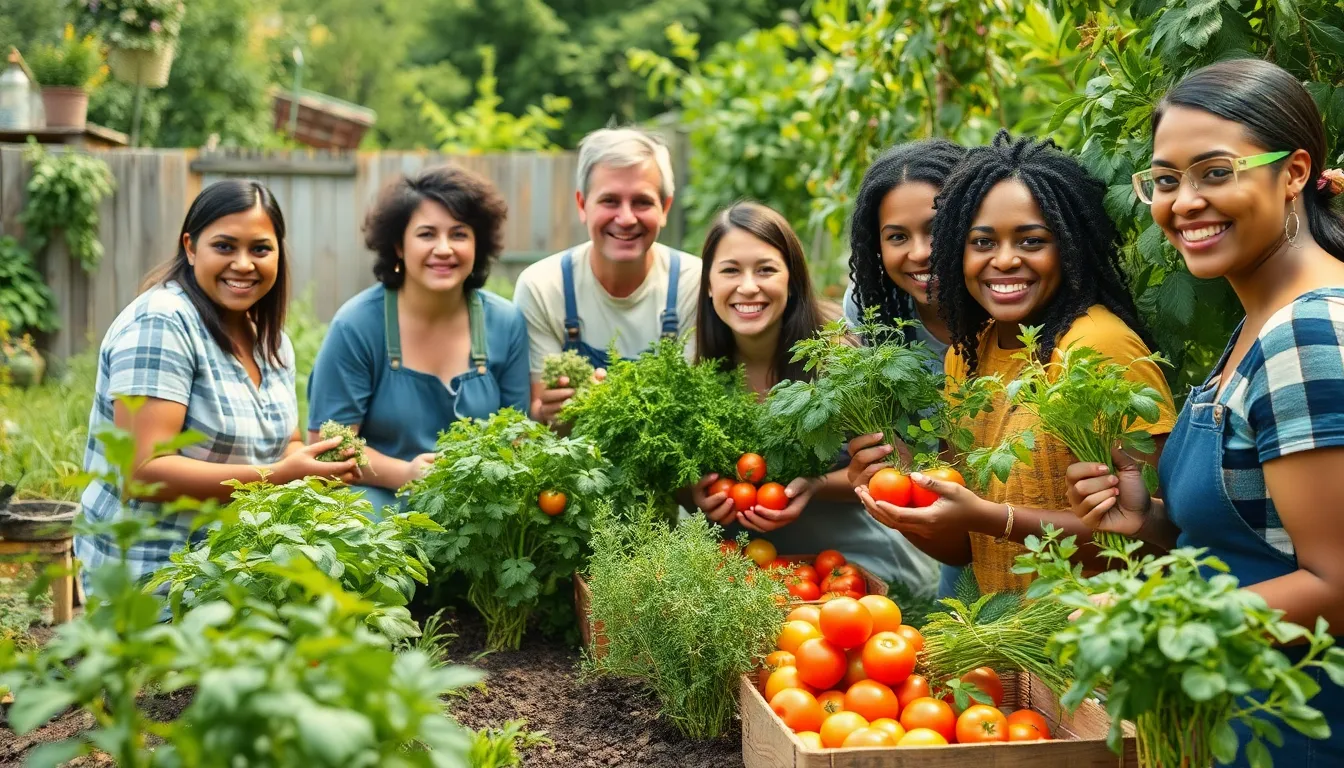In a world increasingly focused on sustainability and healthy living, grow and cook projects are gaining traction among enthusiasts and beginners alike. These hands-on activities not only foster a deeper connection with food but also promote self-sufficiency and environmental awareness. Whether it’s cultivating a small herb garden on a windowsill or transforming homegrown vegetables into delicious meals, the journey from seed to plate is both rewarding and educational.
Engaging in grow and cook projects empowers individuals to take charge of their food sources while exploring culinary creativity. With the right guidance and a sprinkle of enthusiasm, anyone can embark on this fulfilling adventure. Discover the joy of nurturing plants and savoring the fruits of one’s labor, all while contributing to a healthier lifestyle and a more sustainable planet.
Table of Contents
ToggleOverview of Grow and Cook Projects
Grow and cook projects encompass a range of activities focusing on cultivating plants and preparing food from homegrown ingredients. These projects appeal to enthusiasts and beginners alike, fostering a deeper connection to both food sources and nature. Engaging in these efforts promotes the principles of sustainability, allowing individuals to prioritize eco-friendly practices.
Participants in grow and cook projects often experience enhanced self-sufficiency. Growing fruits, vegetables, or herbs at home reduces reliance on commercial food systems. Homegrown produce typically boasts superior flavor and nutritional value compared to store-bought alternatives.
Additionally, cooking with fresh ingredients encourages culinary experimentation. Individuals gain exposure to various cooking techniques and recipes, igniting creativity in the kitchen. This process highlights the importance of seasonality, as home gardeners learn to adapt meals based on what is currently available.
Moreover, engaging in grow and cook projects develops a greater awareness of environmental issues. By understanding the origins of their food, individuals become more conscious of agricultural practices and their impacts on the planet. These activities foster a sense of responsibility towards sustainable living.
Overall, grow and cook projects offer numerous rewards, from promoting healthier eating habits to enhancing knowledge about agriculture, food preparation, and sustainability principles.
Benefits of Engaging in Grow and Cook Projects

Engaging in grow and cook projects offers numerous advantages that enhance personal well-being and promote sustainability. These activities support healthier lifestyles while fostering a deeper connection to food and the environment.
Health Advantages
Health advantages derive from cultivating and consuming fresh, homegrown produce. Participants gain access to nutrient-rich fruits, vegetables, and herbs, which often contain higher levels of vitamins and minerals compared to store-bought options. Growing food organically allows for control over pesticide usage, reducing chemical exposure. Individuals engaged in these projects often report improved physical activity levels, as gardening involves movement and promotes exercise. Additionally, preparing meals with fresh ingredients encourages balanced diets, contributing to overall health and wellness.
Environmental Impact
Environmental impact reflects the sustainability benefits of grow and cook projects. These initiatives significantly reduce carbon footprints by decreasing reliance on commercial food systems, which often involve extensive transportation and packaging. Growing food at home minimizes resource use, lowering water consumption and promoting biodiversity through diverse plant cultivation. Furthermore, these projects foster awareness of agricultural practices and their environmental effects, motivating individuals to adopt eco-friendly habits. Engaging in local food production strengthens community connections and supports sustainable practices, benefiting both individuals and the planet.
Popular Grow and Cook Projects
Various projects exist within the grow and cook movement, engaging individuals and families in sustainable practices while enhancing their culinary skills. These projects include vegetable gardens, herb gardens, and edible flower gardens.
Vegetable Gardens
Vegetable gardens allow individuals to cultivate a variety of fresh produce directly at home. Typical choices include tomatoes, cucumbers, peppers, and zucchini. Growing vegetables ensures a steady supply of seasonal harvests, allowing families to enjoy the flavors of peak freshness. Homegrown vegetables often boast superior taste and nutritional content compared to store-bought options. Engaging in vegetable gardening promotes physical activity and provides valuable lessons about soil health, pest management, and crop rotation.
Herb Gardens
Herb gardens serve as an excellent introduction to growing and cooking projects. Common herbs include basil, parsley, cilantro, and mint. These plants thrive in small spaces, making them ideal for container gardening. Fresh herbs elevate dishes with vibrant flavors and aromatic touches. Incorporating homegrown herbs enhances meal preparation, as cooks can harvest ingredients just before use, preserving their freshness. Maintaining an herb garden fosters awareness of culinary possibilities and encourages the exploration of new recipes.
Edible Flower Gardens
Edible flower gardens offer a unique twist on traditional gardening, allowing individuals to incorporate blooms such as nasturtiums, violets, and calendulas into their meals. These flowers add color, flavor, and nutritional benefits, making culinary creations visually appealing and innovative. Harvesting edible flowers facilitates creativity in both salads and garnishes, enhancing both taste and presentation. Creating an edible flower garden also promotes biodiversity, supporting pollinators and enriching the local ecosystem.
Tips for Successful Grow and Cook Projects
Achieving success in grow and cook projects requires careful planning and the right resources. Participants can enhance their experiences by following these essential tips.
Planning and Preparation
Successful projects often start with thorough planning. Identify available space, soil quality, and sunlight exposure before selecting plants. Create a focused schedule for planting, maintenance, and harvesting to ensure a steady supply of fresh ingredients. Research seasonal planting times for the selected crops, guaranteeing optimal growth conditions. Additionally, consider potential pests and diseases; implement preventive measures, such as companion planting or organic treatments, to protect crops. Document progress and experiences in a gardening journal to track successes and challenges, aiding future projects.
Tools and Resources
Utilizing the right tools streamlines the gardening process and improves outcomes. Essential gardening tools include trowels, pruners, and watering cans. For larger projects, consider investing in gloves, hoe, and rake to make tasks easier. Supplement with high-quality soil, organic fertilizers, and compost to enhance plant health. Leverage local resources such as community gardens or gardening clubs for support and knowledge sharing. Online platforms and gardening books provide valuable insights into plant care and cooking variations. Utilizing these tools and resources ensures a rewarding grow and cook experience.
Engaging in grow and cook projects offers a fulfilling journey that enriches both the body and mind. By cultivating their own food, individuals not only enhance their culinary skills but also foster a deeper appreciation for the origins of their meals. This hands-on approach encourages healthier eating habits while promoting sustainability and environmental stewardship.
As participants explore various gardening techniques and recipes, they unlock the potential of fresh ingredients, transforming everyday meals into culinary delights. The sense of accomplishment derived from nurturing plants and creating dishes from scratch is truly unparalleled. Embracing these projects can lead to a more connected and sustainable lifestyle, benefiting personal well-being and the planet as a whole.




